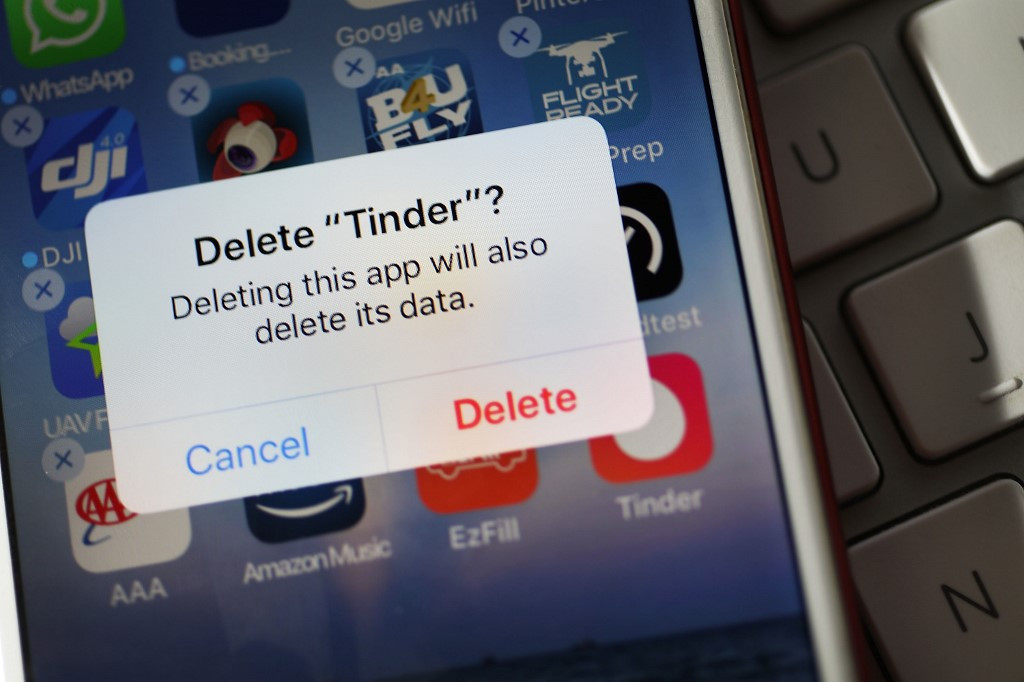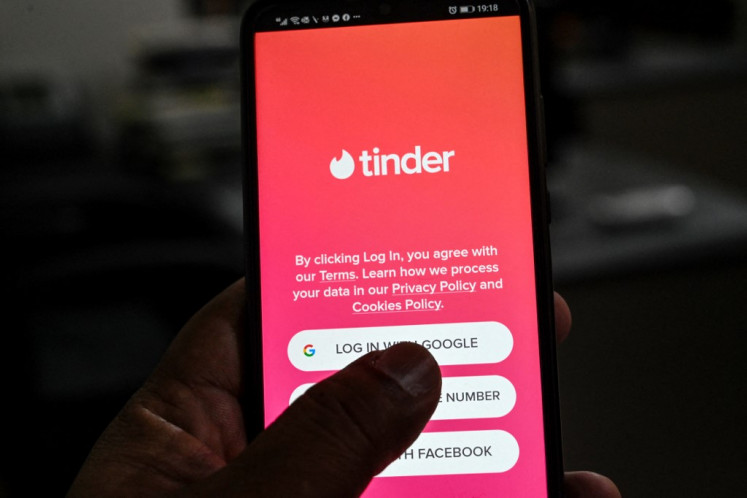Popular Reads
Top Results
Can't find what you're looking for?
View all search resultsPopular Reads
Top Results
Can't find what you're looking for?
View all search resultsThe survivors of dating app violence
As dating apps become increasingly popular in Indonesia, cases of sexual assault and deception have risen. We spoke with some survivors about their stories.
Change text size
Gift Premium Articles
to Anyone
Warning: The following article contains descriptions of rape, emotional abuse and forced abortion.
To her friends, Shara is a bright and exceptionally funny woman. That’s also what the man she met on Tinder told her. He liked her, he said, because she was talkative and had a way of entertaining him.
Shara, 28, used the dating app Tinder because of social pressure. Almost all her friends were married and had children. They told her to get a boyfriend, teasingly saying she was gay.
Busy with work, a relationship didn’t feel like a priority for Shara. She found herself awkward around men and had only gone on one date. But after she installed Tinder, one man caught her attention. He was easy to talk to and shared her interests.
The chemistry between them grew, and the chats became more intense, eventually graduating to video calls. They then met in person for lunch, but nothing more. He was still just a friend.
One day, he asked to visit. “I am currently working from home and need someone as company,” he said. She let him, not suspecting anything. They had known each other for a while, and she had grown to trust him. The meeting was also arranged for the afternoon and neighbors would be nearby.
But once in her room, he pinned her down, grabbed both of her wrists with one hand, and raped her. She cried and asked him why, to which he shrugged and said, “I couldn’t control my libido,” and, “It’s what everyone else is doing.”
Another dating app user, Aisha, 27, was a victim of emotional abuse. A religious person, Aisha was attracted to a man from Tinder who presented himself as a strongly Islamic person. Aisha fell for his high-cut pants and bearded look.
He claimed to be single and asked her to move in with him. Months later she discovered the man had been married for two years. One of his friends told her he hunted for women who wore hijabs on dating apps and left them once he was “bored”.
“I felt betrayed because he had taken everything from me, and he promised me that we would have better lives.” Aisha said. “Turns out he left me.”
Shara and Aisha’s experiences are, unfortunately, not unique. Sexual harassment, violence and deception through dating apps in Indonesia were recently thrust into the spotlight through the case of an alleged sex offender, LWD, who has been accused of harassing or deceiving hundreds of people – some of whom he allegedly impregnated. More than 150 individuals shared their accounts of his actions through the Instagram account @aliskamugemash.
Afina Nurul Faizah, one of the volunteers who, alongside the admin of @aliskamugemash, has been collecting survivors’ reports and assisting them, said the LWD case was “a drop of water in the ocean”.
Afina has since received reports from survivors of sexual violence and deception on dating apps beyond LWD’s case. “Women on dating apps are more vulnerable because they barely get any help,” she said.
Afina referred to the heavy stigmatization of the survivors of sexual violence who had used dating apps. They were blamed for having made accounts and were made to feel inferior for falling prey to predators.
“If you read the comments on @aliskamugemash, you will see many of them blaming the survivors,” Afina said. “This kind of behavior is also perpetuated in our everyday lives. That’s one of the reasons women choose to stay silent.”
Dhyta Caturani, the head of Purple Code, a feminist organization working on cyber security issues, said that dating app platforms placed the full responsibility of sexual harassment and assault on the survivors.
Though Tinder has progressed by launching the “Does This Bother You” machine-learning tool, which helps flag potentially offensive messages, Dhyta noted that those reports were barely followed up on.
It becomes more tricky when the issues happen outside of the apps. “The platforms consider this no longer their responsibility,” Dhyta added.
Dating apps like Tinder are becoming more popular in Indonesia, but their users are often stigmatized when they have negative experiences on the platform. (AFP/Aamir Qureshi)Trauma and confusion
Shara soon discovered she was pregnant. The man avoided responsibility, saying the baby wasn’t his. He brought her a drug to terminate the pregnancy. She didn’t want to take it, but he insisted. After consuming it, she bled for days and had to be taken to the hospital.
“[The hospital staff] kept asking about my marriage status, and it only made me feel more ashamed and depressed.”
She also had to endure a painful curettage procedure, a method of clearing the uterine lining after an abortion or miscarriage, without anesthesia because her heart rate was deemed too unstable.
Shara withdrew from her friends and family. “I feel devastated. All my dreams and hopes are gone. I could not eat for days and could only cry in my room,” she said.
“Women are still perceived as objects of sexual desire that will attract violence. They are taught to blame themselves for the violence they experience,” Danika Nurkalista, an adult clinical psychologist and coordinator for psychological services at Yayasan Pulih, said.
Danika said that self-blaming could be a coping mechanism. “By blaming themselves, the survivors feel like they are in ‘control’, when in reality [that’s not the case]. Nobody chooses to experience violence.”
Survivors find it difficult to get out of abusive relationships. Aisha realizes that the man manipulated her further – cutting her off from her friends and verbally abusing her – but she also longs for him.
Danika Nurkalista explains this as a part of the abuse cycle. The honeymoon phase, when the perpetrator of abuse showers the victim with affection and love, places survivors in a state of denial about the violence inflicted, deepling their emotional and sometimes economic dependence.
“It’s hard for the victim to get out of the cycle once they are trapped in it.”
Imbalanced platform
Dhyta highlighted how sexual violence and deception were furthered by the app’s algorithm.
“This technology is mostly built by men, and often the user experience, especially that of marginalized groups, is not taken into consideration when it comes to building the product,” she said.
The lack of law enforcement regarding violence against women and the lack of education regarding digital security also complicate the situation.
“Education on internet use tends to be applied in the context of limitation: ‘Block this; don’t use this because it’s dangerous.’ We need instead to educate our citizens on how to use technology more wisely, to be more knowledgeable, and skillful – including when using dating apps,” she noted.
Dytha said women and other vulnerable groups could learn how to navigate the app better, including by carefully studying their safety features, documenting inappropriate behavior, capturing the user’s profile to be used as evidence and staying vigilant when deciding to meet offline.
For Shara and Aisha, the pain still feels real, but they hope that the future will bring about the happiness that made them who they were.
“I want to start a good family,” Aisha said, “with someone who can accept my flaws. I don’t want anything like this to happen again [...] But for now, I want to heal.”
With a rueful smile Shara said, “After the incident, I feel like I’ve lost myself, and I’m embarrassed before God. I’ve become introverted and very sensitive. I miss the old me.”












